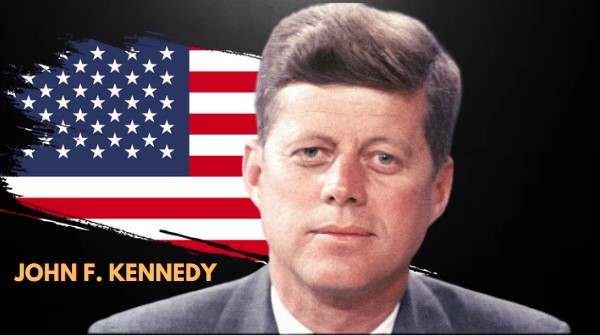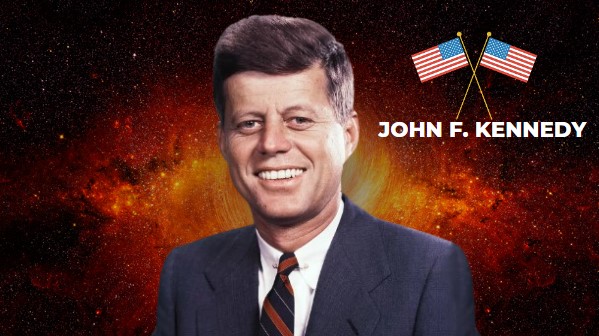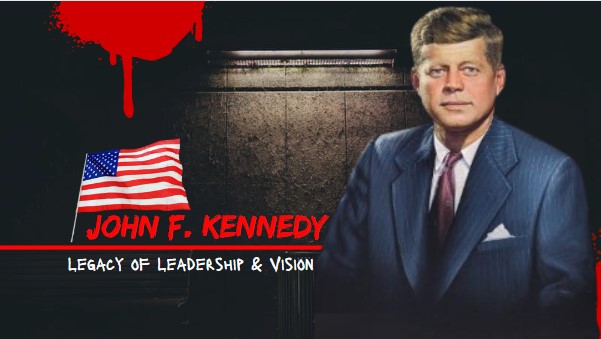
John F Kennedy, whose full name is John Fitzgerald Kennedy, was widely known as JFK. He was the 35th President of the United States and a figure of profound significance in American history. He was born into a prominent family. Several remarkable achievements and severe challenges marked Kennedy’s political journey. This article delves into the life, presidency, and lasting legacy of John F Kennedy, which made him a charismatic leader whose influence inspires the new generations.
Early Life and Education
John F Kennedy was born in Brookline, Massachusetts, on May 29, 1917, into a wealthy and influential family. His father, Joseph P. Kennedy Sr., was a successful businessman and politician, and his mother, Rose Fitzgerald Kennedy, was the daughter of a prominent Boston politician. Kennedy was the second of nine children, and his childhood was marked by privilege and education.
He attended prestigious schools throughout his early years, including Choate School and Harvard College, where he excelled academically and demonstrated an interest in politics. His early exposure to politics through his father’s involvement undoubtedly significantly shaped his future career path.
Military Service
In 1941, John F. Kennedy enlisted in the United States Navy during World War II. He was assigned to the South Pacific and served as a lieutenant, commanding a patrol torpedo boat. During a mission in 1943, a Japanese destroyer rammed and sunk his ship. Kennedy displayed remarkable bravery and leadership despite severe injuries, leading his crew to safety. This heroic act earned him the Navy and Marine Corps Medal and the Purple Heart.
Political Career Beginnings
After the war, Kennedy’s interest in politics intensified, and he decided to pursue a career in public service. In 1946, he ran for the U.S. House of Representatives and won, becoming the youngest elected congressman at 29. During his time in the House, Kennedy focused on civil rights, education, and labor issues.
1952 he successfully ran for the U.S. Senate, further solidifying his position as a rising political star. Throughout his Senate career, he continued to advocate for social justice and economic reform, earning a reputation as a progressive and forward-thinking politician.
The Presidential Campaign of 1960
In 1960, John F. Kennedy announced his candidacy for the Democratic Party’s presidential nomination. His campaign emphasized the need for new leadership and a vision for a better America. Vice President Richard Nixon’s opponent was a formidable contender, but Kennedy’s charisma, eloquence, and ability to connect with the American people set him apart.
The televised debates between Kennedy and Nixon played a crucial role in shaping public opinion. Kennedy’s poised and confident demeanor in these debates contrasted with Nixon’s nervousness, which contributed significantly to Kennedy’s victory in the 1960 presidential election.
Presidency and Key Accomplishments
i.Civil Rights
During his presidency, Kennedy faced numerous challenges, one of the most significant being the struggle for civil rights. He took a firm stance against racial segregation and discrimination, advocating for equal rights for all citizens. In 1963, he delivered a historic speech supporting civil rights, where he famously stated, “We are confronted primarily with a moral issue.”
ii. Space Exploration
Kennedy’s vision also extended beyond the confines of Earth. He became a driving force behind the Apollo space program, setting the ambitious goal of landing an American astronaut on the moon by the end of the 1960s. His unwavering commitment to space exploration laid the groundwork for NASA’s successful Apollo 11 mission, which achieved this historic feat in 1969.
iii. Cuban Missile Crisis
In 1962, the world witnessed one of the most intense moments of the Cold War: the Cuban Missile Crisis. When the Soviet Union placed nuclear missiles in Cuba, tensions between the U.S. and the Soviet Union reached a dangerous level. Kennedy’s skillful diplomacy and leadership averted a nuclear war, as he negotiated with Soviet Premier Nikita Khrushchev to remove the missiles while assuring the U.S. would not invade Cuba.
iv. Alliance for Progress
Kennedy launched the Alliance for Progress in 1961 to improve relations with Latin American countries. This initiative aimed to promote economic development and social progress in the region and foster cooperation and mutual understanding between the United States and its neighbors to the south.
v. Peace Corps
Kennedy established the Peace Corps in 1961 to promote goodwill and international cooperation. This volunteer program sent young Americans abroad to assist in various countries’ social and economic development projects. The Peace Corps symbolized American compassion and support for global progress.
Assassination and Legacy
On November 22, 1963, tragedy struck the nation when President John F Kennedy was assassinated in Dallas, Texas. The shocking event left the country in mourning and disbelief, and the world lost a leader who had inspired hope and change.
i. The Tragic Event
The assassination of JFK remains one of the most debated and investigated events in history. Lee Harvey Oswald was charged with the crime but was shot and killed before trial. As a result, the mystery surrounding the incident increased further.
ii. Impact on American Society
Kennedy’s assassination had a profound impact on American society. The nation lost a leader with immense potential, and a sense of innocence was forever shattered. His death also intensified the call for civil rights reforms and sparked discussions about gun control and the need for better protection for public figures.
iii. Commemoration and Tributes
In the aftermath of his death, John F Kennedy was commemorated in various ways. The John F. Kennedy Presidential Library and Museum in Boston was established to preserve his legacy and promote the study of American history and culture. Countless memorials, statues, and monuments were erected in his honor across the country, ensuring his impact would be remembered for the next generations.

The Family Legacy
The Kennedy family’s impact on American politics and public service extended far beyond John F. Kennedy’s presidency. Several of his family members, including his brothers Robert and Edward Kennedy, were also influential figures in American politics, each leaving their mark on the nation.
Conclusion
John F. Kennedy’s presidency may have been tragically cut short, but his legacy lives on. As a visionary leader who championed civil rights, space exploration, and international cooperation. Kennedy inspired a generation and continues to be celebrated as a symbol of hope and progress. His memory serves as a reminder of the transformative power of leadership and the lasting impact a single individual can have on history.
John F Kennedy quotes
Here are some notable quotes from John F. Kennedy
1. “Ask not what your country can do for you, ask what you can do for your country.”
2. “My fellow Americans, ask not what your country can do for you, but what you can do for your country.”
3. “Change is the law of life. And those who look only to the past or present are certain to miss the future.”
4. “Efforts and courage are not enough without purpose and direction.”
5. “Conformity is the jailer of freedom and the enemy of growth.”
6. “Those who dare to fail miserably can achieve greatly.”
7. “Let us never negotiate out of fear. But let us never fear to negotiate.”
8. “For in the final analysis, our most basic common link is that we all inhabit this small planet. We all breathe the same air. We all cherish our children’s futures. And we are all mortal.”
9. “The time to repair the roof is when the sun is shining.”
10. “Mankind must put an end to war, or war will put an end to mankind.”
These quotes reflect President Kennedy’s charisma, vision, and his commitment to public service and progress.
FAQs
1. Was John F. Kennedy the youngest U.S. President?
No, John F. Kennedy was not the youngest U.S. President. Theodore Roosevelt holds that distinction, becoming President at the age of 42.
2. What were John F. Kennedy’s major accomplishments during his presidency?
Some of John F. Kennedy’s major accomplishments during his presidency include advancing civil rights, initiating the Apollo space program, resolving the Cuban Missile Crisis, and establishing the Peace Corps.
3. How did John F. Kennedy’s assassination impact the nation?
John F. Kennedy’s assassination deeply impacted the nation, leading to a collective sense of grief and loss. It also spurred discussions on gun control and the security of public figures.
4. What is the significance of the Peace Corps initiated by Kennedy?
The Peace Corps, established by Kennedy, symbolizes America’s commitment to international cooperation and supporting social and economic development around the world.
5. How is John F. Kennedy commemorated today?
John F. Kennedy is commemorated through various memorials, statues, and monuments across the United States, as well as through the John F. Kennedy Presidential Library and Museum in Boston.






